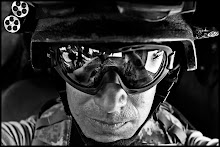An Iraqi man sits in a chair in small wood shack with no windows and little ventilation। A torn shirt blindfolds his eyes and his wrists are tightly bound with plastic, military handcuffs। He sits perfectly still even as he hears the door open।
© zoriah/www.zoriah.com - blog use permitted, use credit, link to zoriah.com
An American soldier sits in front of the man and pulls off his blindfold as his eyes struggle to adapt to the light। “What were you doing walking along the highway? Don’t you know that is a restricted area?” After a masked Iraqi translator speaks to the man in Arabic he replies “my car was broken down, I had to walk.”
“We found nearly four thousand US dollars in your pocket, why do you have so much money” asks the interrogator। “I own a computer shop। I had to go and pick up a shipment in another city, there are receipts for my order along with the money” the man responds। The soldier is getting frustrated and obviously does not believe the man। “That’s bullshit, no one carries that much cash…what were you doing with that money? Is it for weapons, are you buying weapons।”
© zoriah/www.zoriah.com - blog use permitted, use credit, link to zoriah.com
As the man shakes his head, the translator begins to explain to the interrogator that most Iraqis do not have bank accounts or credit cards and actually do most of their business in cash. That, and the fact that with only one hour a day of electricity, few banks are even open. The story does not seem to sink in and the interrogator continues on the same path for quite a while, before finally realizing that the mans story will not change.
Another soldier uses a biometric device to scan the man’s retina, fingerprint and enter his personal data on the small screen. I walk outside with the interrogator. I ask him what will happen next and he replies “we don’t have anything on him, we will probably just release him tomorrow if we cant get anything else out of him.”
The next day the man is driven back to where he was picked up and given back his money and personal belongings. I ask the interrogator how many detainees they bring in each day and what percentage, in his personal opinion, are actually guilty. “Sometimes we only bring in a few guys a day, sometimes we can take in a couple hundred. In my opinion, less than 1% of them have done something wrong.”
A couple of weeks later while stationed at another base with a different platoon, I find out that a group of detainees are about to be released. Although formally forbidden to take photos of ANY detainees under ANY circumstances, I am close with the unit and they invite me along.
The detainees, still blindfolded and cuffed are led into a convoy of armored vehicles. We set out to drop the men off in the area that they had been taken into custody the day before. It is about a fifteen minute drive and the sun is beginning to set.
“This is it, this is where we picked them up” says one of the soldiers as the convoy pulls off to the side of the road in a residential neighborhood. The detainees are led out of the vehicles and lined up against a wall. Their blindfolds are taken off and when the men realize that they are being released they begin to cry with relief. They look absolutely exhausted, their clothes filthy and torn with a look of fear and confusion on their eyes.
As the soldiers escort the detainees back to their homes, a crowd of friends and relatives begins to gather on the streets. There is screaming, crying and hugging as the community sees the missing men are alive. Two women faint and are held up by their husbands and sons.
© zoriah/www.zoriah.com - blog use permitted, use credit, link to zoriah.com
One man starts screaming in English “why did you do this? Why did you take them? They are graduate students at the University. These are not terrorists they are students! Why did you take them? What did you do to them?
© zoriah/www.zoriah.com - blog use permitted, use credit, link to zoriah.com
In Iraq, if someone does not come home by nightfall, the family fears the worst. When they have not returned by the next morning, they assume that their loved ones are dead. When finally reunited, it is a truly emotional experience. When detainees are held indefinitely, the family often never knows they were taken into custody and assumes they have been killed and that they will not see them again. Under the US Patriot Act, detainees can be held indefinitely without any trial or any opportunity to speak with or notify their families.
© zoriah/www.zoriah.com - blog use permitted, use credit, link to zoriah.com
-
This story is featured in its entirety on the following sites:
-
Color: www.warphotographer.org
Black and White: www.diariesofashooter.com



1 comment:
Breathtaking photos - please post more stories of Afghanistan. Thanks!
Post a Comment